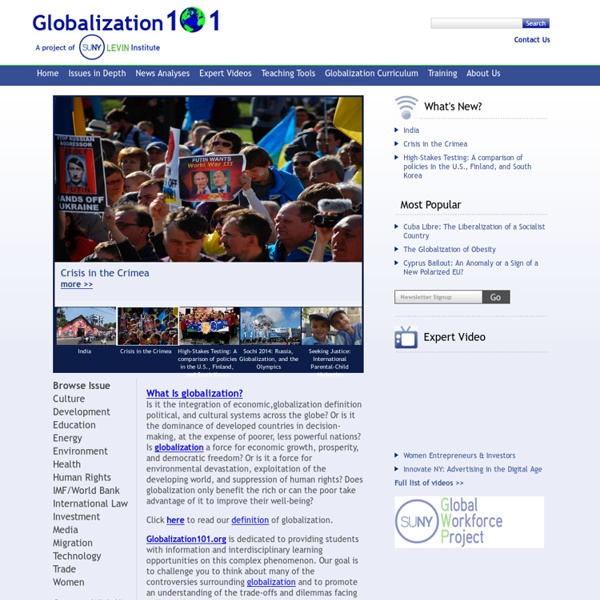



My Wonderful World - Geography Awareness Week Geography Awareness Week Celebrate Geography and The New Age of Exploration November 17th through the 23rd in 2013. Celebrated in conjunction with the National Geographic Society’s 125th Birthday the week's theme focuses on how geography enables us all to be intrepid explorers in our own way. Check out the newly created archive of past Geography Awareness Week materials, a new suite of resources all about Geography as a field and discipline, and even more tips and tools to plan your own GeoWeek celebrations! Read more about the history and purpose behind Geography Awareness Week. Looking for even more resources? Free Middle School Social Studies Lesson Plans Kidipede - History for Kids home page NEW! Kidipede's pages organized according to California state standards Teachers' guides for what to do in class (religion, philosophy, environment...) Scavenger hunt through the site for certain information (lists of things to search for here) Have the students put together questions for their peers to answer. Create a History Museum with each kid making an artifact; invite their parents for museum night. Put together a class newspaper about China (for instance), with creative sports pages, food pages, political news and religious news. Put together what was happening all over Europe, Asia and Africa in a particular time period (use the maps section). Have students take different sides of a war (the Crusades, the Punic Wars, the American Revolutionary War, the Persian Wars, the Peloponnesian War, the Hundred Years' War) and hold peace talks to try to settle their differences. Do hands-on craft projects like spinning or and weaving a piece of cloth.
North Carolina Council on Economic Education - Home Page History Link 101 Social Studies NOTE :: Various file formats are used on this page that may require download. If larger than 1mb, it will take longer to download. For instructions or more information, please visit our download page. Social studies is the integrated study of the social sciences and humanities to promote effective citizenry. Within the K-12 program, social studies provide coordinated, systematic study drawing upon such disciplines as economics, history, geography, anthropology, archaeology, law, philosophy, political science, religion, and sociology, as well as appropriate content from the humanities, mathematics, and the natural sciences. United States Senate Youth Program The United States Senate Youth Program is an educational opportunity for outstanding high school juniors and seniors interested in pursuing careers in public service. For additional information contact: Michelle McLaughlin NC Senate Youth Program Coordinator michelle.mclaughlin@dpi.nc.gov
Home [CRF: Educating About Immigration] Resources for Educators World View’s resource page brims with excellent education resources in global studies. No matter your discipline, there is good information out there that can help you bring an even stronger global perspective to your classroom or school. We have compiled many strong web sites and lesson plans in the categories provided below. If you find a useful website not on our lists, please let us know. Subject: Region: Grade: Additional Resources: Educational Organizations and Professional DevelopmentGrants and Awards (including travel) Study Abroad for Students
Renaissance -- Out of the Middle Ages In the feudal structure of the Middle Ages, the nobles who lived in the country provided the king with protection in exchange for land. Peasants worked the land for the nobles, for which they received protection and their own small parcels of land. These rural peasants worked from sunup to sundown, but even the nobles had few creature comforts. In feudal cities, where there was a small middle-class population, life was a little easier and individuals had the freedom to pursue whatever trade or industry they liked. In the late Middle Ages, when the threat of invasion from barbarians had lessened, people left the country for towns and cities so they could engage in more profitable pursuits. The Plague Begins Life in the city was soon to change drastically. The Plague's Effect on the Economy The population decrease caused by the plague led to an economic depression.
US Statistics, State Comparisons The Black Death A Great Plague killed nearly half of the people of Europe during in the fourteenth century. A plague is a widespread illness. The plague was also known as "the Black Death" because of the black spots that formed on the skin of diseased people. The sickness apparently began in Central Asia. The first sign of the plague was often an ache in the limbs. The swiftness of the disease, the enormous pain and the grotesque appearance of its victims served to make the plague especially terrifying. Europeans were susceptible to disease because many people lived in crowded surroundings in an era when personal hygiene was not considered important. Some Europeans believed the plague was a sign from God. The Great Plague transformed European society. The Great Plague continued to affect cities from time to time for hundreds of years. Download this lesson as Microsoft Word file or as an Adobe Acrobat file. Listen as Mr.